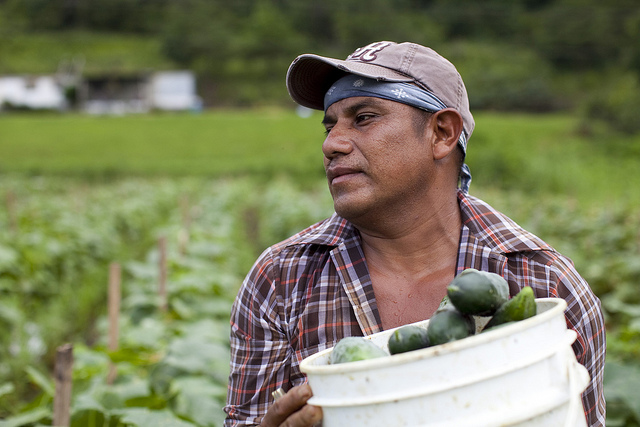 The American agricultural industry is facing billions of dollars in losses due to labor shortages resulting from recent anti-immigrant laws passed in various states around the country. The American farming industry is heavily dependent on undocumented workers, and according to a recent article in Time Magazine, has had an extremely difficult time replacing those who have fled as a result of laws like Arizona’s SB 1070 or Alabama’s HB 56.
The American agricultural industry is facing billions of dollars in losses due to labor shortages resulting from recent anti-immigrant laws passed in various states around the country. The American farming industry is heavily dependent on undocumented workers, and according to a recent article in Time Magazine, has had an extremely difficult time replacing those who have fled as a result of laws like Arizona’s SB 1070 or Alabama’s HB 56.
According to the article:
“Roughly 70% of the 1.2 million people employed by the agriculture industry are undocumented. No U.S. industry is more dependent on undocumented immigrants. But acute labor shortages brought on by anti-immigration measures threaten to heap record losses on an industry emerging from years of stiff foreign competition. Nationwide, labor shortages will result in losses of up to $9 billion, according to the American Farm Bureau Federation.”
The affected farmers are not just those living in Arizona, Alabama, Georgia, Indiana, South Carolina, or Utah. Time points out that North Carolina has been experiencing similar labor shortages as well, indicating that the negative impact of these laws has not been confined to the states enacting them.
The shortage persists in spite of the fact that the farmers have been offering competitive packages to domestic workers in a struggling economy. Domestic workers, they suggest, simply do not want to do the low-paying and grueling work usually done by immigrant workers. As a result, large portions of their crops are being left on the vine to rot. These findings fly in the face of arguments that undocumented skilled laborers are “stealing” American jobs,” as opposed to being essential members of the American economy who fill economic voids that very much need filling.
Another recent Time article highlighted the fiscal fallout of the draconian state immigration laws, and the evidence on the economic benefits of a more open immigration regime have been clear quite some time.
The impact on agriculture is the latest indictment of the “self-deportation” strategy, which time has shown to be an economic, legal, and humanitarian catastrophe. As we mentioned last week, some cities have begun to a more welcoming approach, and will probably be much better off for it. The question that now must be asked is this: what reasons remain for supporting regressive immigration policies that harm America’s agriculture, economy, and families? It is perhaps best put by Nan Walden, the Arizona pecan farmer quoted in the Time article:
“’We feel strongly that there has never been a greater need for federal leadership for immigration reform,’ says Walden. ‘The United States farmer is still the most efficient in the world, and if we want to be in charge of our food security and our economy and add favorably to our balance of payments, we need to support a labor force for agriculture.’”
Photo by Laura Elizabeth Pohl/Bread for the World
FILED UNDER: Immigration Law, SB 1070, undocumented immigration


